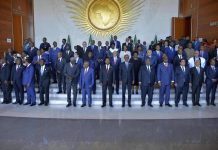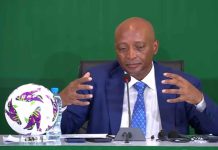Africa-Press – Mauritius. In this interview with Kugan Parapen, economic spokesperson for Rezistans ek Alternativ, Mauritius Times delves into the intricacies surrounding the potential timing of the next general elections.
Against the backdrop of speculation and political manoeuvring, Kugan Parapen provides insightful perspectives on the democratic implications, the strategies of the ruling party, and the challenges facing the opposition.
He also addresses questions on the opposition’s performance, potential game-changing factors in the upcoming elections, and the socio-economic consequences of political decisions.
As the political stage unfolds in Mauritius, the interview also explores external influences, global economic trends, and the critical choices facing the electorate.
Mauritius Times: There have been a lot of speculations on social media, as well as prognostications by local “politologues,” about the timing of the next general elections, especially in the wake of Pravind Jugnauth’s casual but deliberate remark that the elections could also take place beyond 2024.
Beyond the longing for some fresh air in the governance of the country, does it matter when the elections are held?
Kugan Parapen: From a strictly democratic perspective, it is somewhat a joke that the date of the most important event in the country’s democratic calendar remains unknown until a few weeks before it actually happens.
Adding insult to injury is the fact that the onus of such a decision fall into the hands of the Prime Minister solely. While the most fervent supporters of the MSM will say that this has always been the case and that this is the prerogative of all Prime Ministers of the Republic, an unbiased assessment of such a prerogative can only see its unfair nature.
If we recall what happened the last time general elections were held in our country, we will remember the nastiness surrounding the dissolution of parliament.
Then, the incumbent MSM government kept saying that they would see out their mandate but, in the meantime, they were secretly getting ready for elections.
So much so that when parliament was dissolved, Jugnauth was more than ready to hit the campaign ground running while the opposition was yet to get in their stride.
Should we expect a repeat of 2019 in 2024? Probably. As such, it does not really matter when elections are held, unless you are a staunch astrology believer as we hear some are.
What matters more is the degree of an unfair advantage the government can garner by catching the opposition by surprise. With that in mind, I would say that it is up to the opposition forces to be ready and not get caught by the pettiness of the MSM once again.
* It’s the government of the day that can fill the pockets of electors in exchange for their support, and what we have been seeing lately is that it has started to put the political conditions in place for the holding of elections anytime within the next three to six months.
The Opposition cannot beat the MSM-led government at that game. Does this mean that the election outcome could be highly predictable? History has taught us that the run-up to an election is generally less important than the full journey leading to a general election.
It is then quite possible that the outcome of the next election has already been sealed. How much can the government do in the coming months to alter the perception of the people on its tenure?
On numerous occasions in the past we have seen governments attempt last-ditch manoeuvres to improve their appeal vis-à-vis the electorate but to no avail.
That said, a trump card can be a game changer. For example, the last minute Medpoint alliance between the MMM and the MSM in 2000 was such a trump card. Who is in possession of a trump card in 2024? Will they know how and when to use it if they do indeed possess one?
* In the meantime, would you say that the opposition has lived up to the people’s expectations and to yours personally?
I suspect you are referring to the parliamentary opposition here. By and large, the mainstream parliamentary parties are aging, especially those politicians who are close to the leadership of these parties.
Now, I know that age is just a number, but one cannot but acknowledge the disconnect between these traditional opposition parties and the younger generations.
Jugnauth’s team has recognised that and that is why he has made a special effort to woo this electorate over recent months. Coming back to our appreciation of the opposition, we need to recognise that Mauritius is tending towards multipartism.
Thus, an appraisal of the opposition cannot be limited to parliamentary parties only, but we also need to include extra parliamentary parties as well.
It is high time to realise that if our electoral system featured a decent proportional representation (PR) layer, multiple parties would be elected to parliament as is currently the case in sound democracies across the world.
We need to appraise the work of the opposition in a context whereby the government has had increasingly recourse to what many would qualify as fascist methods.
MSM and its allies were on the ropes when the public manifested its discontent following the Wakashio disaster. Never in the history of this country had so many people taken to the streets to express their anger and exasperation with a government.
The second lockdown, which occurred in early 2021, was a timely ‘distraction’ for the government and allowed those in power to divert that deep-rooted anger.
Then through strategic targeted actions, they managed to instil a degree of fear in many and have been surfing on this seemingly calm ocean ever since.
But is anything brewing underneath? We are often told that citizens of this country settle their scores with politicians in the secrecy of the voting booth.
. Their verdict is imminent!
* Whatever the views of opinion makers and the Opposition inside or outside Parliament regarding the current government, ultimately it will be the choice of the electors whether to vote the current government back into office or opt for the Opposition.
That would effectively reflect the democratic nature of the electoral process and the role of the electors in determining the government, don’t you think? Vox Populi, Vox Dei.
If we are to remain a credible democracy, it is absolutely essential that we respect the outcome of the next general elections, irrespective of who wins or loses.
Over the years and elections, there has been an admirable and laudable serenity when it comes to political transitions in this country. Alas, there has been a departure from this peaceful and respectful transfer of power in 2019.
Unfortunately, the sheer number of people who were nowhere to be found on the ballots does raise a few serious question marks. We must do our utmost to ensure that such disturbing occurrences do not repeat themselves this year or at any other time in the future. Democracy is precious!
* What if the Pravind Jugnauth-led alliance were to win his gamble, which could also be seen as an endorsement by the electorate of his policies and strategies? What do you think would happen to the traditional parties and the leadership of the Labour Party, the MMM, and the PMSD in the short- and medium-terms?
Our country has long lost dignity when it comes to politics. Political parties have turned their back on democratic traditions and are nowadays a shadow of their former selves.
One would like to think that a triumph of Jugnauth at the next general elections would herald a deep-rooted renewal of staff within all opposition parties. But we do not expect this to materialise. Stepping down is not in the DNA of our politicians.
Who was the last major leader of a political party to make way following an electoral defeat? Can Mauritius envisage a 34-year-old Prime Minister as is currently the case in France?
For More News And Analysis About Mauritius Follow Africa-Press







